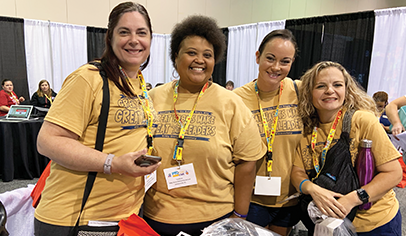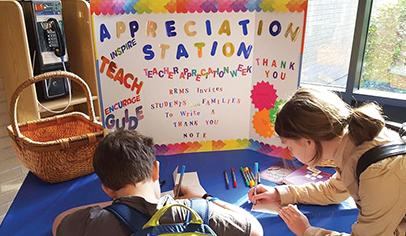Don’t Charge Dues
The annual membership drive is a staple for PTOs and PTAs. Join the parent group, the pitch goes, to support the school. The problem with this message is that it’s one of exclusion rather than inclusion. It’s the opposite of what you spend the rest of the year trying to communicate to parents—that everyone should get involved and support the school. And the membership message—you can be part of the parent group only if you pay dues—comes right at the beginning of the year, when people are just forming their impression of your group.
For most parent groups, the number one challenge is building involvement. You want more people to attend your events, volunteer, and take on leadership roles. Building involvement is important not just for the parent group but for the health of the school as a whole. More involved parents equals a stronger and more supportive school community.
Charging dues discourages involvement in two ways. First, it communicates that the parent organization is for members only. Second, some parents think that if they pay dues, they’ve done enough; they don’t need to get actively involved because they’re supporting the school with their money. Paying dues provides a built-in excuse not to participate.
PTA groups (those local groups formally affiliated with the national and state PTA) have to charge dues by rule, but they can work to keep their total dues price to a minimum by setting the local portion of dues as low as possible. For independent PTOs (all those local groups like PTOs and HSAs and PCCs not affiliated with the national PTA), the alternative to charging dues is to make everyone who has a child in the school a member of your group automatically. That sends the message that supporting the school is everybody’s concern. It’s probably the same message you convey all the rest of the year except during your membership drive. And if your group is like most, it’s the way you act, too. You send your communications to every parent, not just those who pay to become members. You welcome everyone at meetings and events, and you’re happy to have volunteer help from anyone, whether or not they have paid dues.
The bottom line: Doing away with dues sends a powerful involvement message. If you need the money that dues brings in, roll it into your fundraising. Focusing on building involvement will help you raise more, anyway. Which brings us to Don’t number two.
Don’t Focus Primarily on Fundraising
This is probably the biggest catch-22 for any school parent group. Raising money has become increasingly important for many groups as school budgets have declined over the past several years. Tight times mean more and larger gaps that must be filled, usually by the PTO or PTA. But the more you fundraise, the lower your returns become for each fundraiser.
It’s a natural progression. Parents get tired of fundraising appeals. Or they decide that because they contributed the last time, they don’t need to support you this time. You get tired of making those appeals. Your volunteer base dwindles, too; organizing fundraisers isn’t a job that gets volunteers inspired, at least not over the long term.
The solution, believe it or not, is to focus less on fundraising and more on building parent involvement. Work harder to get more parents connected to your group and the school and less hard at separating them from their money. They’ll be happier, and so will you. And your parent group will raise more money.
It’s the secret of successful fundraising: The more connected that people feel to a cause, the more likely they are to support it financially. When you fundraise, every parent with a child in the school should feel a personal interest in supporting your fundraiser. And in fact, school fundraisers do extremely well. Any national cause could only dream of attracting the percentage of supporters that parent groups get for their fundraisers.
The way to do even better, however, is to make a personal connection with more families. You make that connection by holding family events, having a presence at back-to-school night, becoming a resource for information about the school—anything that helps you interact with parents in a low-key way. You’re building involvement, and you’re showing them firsthand the importance and the effectiveness of the school’s parent group. Ultimately, that kind of connection will make them more likely to support your fundraising.
The bottom line: Limit your group to two or three major fundraisers a year. Make sure they’re well-planned and well-executed, and spend the rest of your time building parent involvement and helping the school in other ways. In other words, fundraise less but fundraise better. It will make a real difference.
Don’t Worry About Meeting Attendance
There are many things you can do to improve meeting attendance. To begin with, you can make sure your meetings are planned in advance, well-run, and short. Short as in no longer than an hour.
You can have a greeter at each meeting to make sure that new people feel welcome and comfortable and that they will want to come again. You can avoid insider talk and make sure to include new people in discussions. And even though all you veterans know each other, you can wear name tags so that newcomers will be able to call you by name—and you them.
You can also have special presentations, guest speakers, a song by the school chorus, a student art show, or any number of other enticements.
All of these are good ideas that your group should consider. But none of them is likely to dramatically improve your meeting attendance for more than a few meetings. If seven regulars attend your meetings now, you might raise that to 12 or 15, but probably not 50. The reason is straightforward: People dislike meetings. Not everybody, of course, but it’s a widespread feeling.
That’s not necessarily a bad thing. Of course, it would be great to get lots of people participating at that level. But there’s another issue at work. Parents of school-age children have a limited amount of time that they are able or willing to devote to the PTO or PTA. In fact, surveys show that concern about time commitment is the number one reason people choose not to get involved in volunteer activities.
People only have so much time they can use to volunteer. So what would you like them to do—help out with a family night, carnival, field trip, teacher appreciation program, fundraiser, or one of the many other things you do? Or spend their volunteer time attending meetings?
The bottom line: Many parent group leaders put too much importance on the number of people they’re able to attract to meetings. That’s not a great measure of the success of your group. If you have lots of people helping organize and execute your programs and activities and if you have plenty of people at your family events, that’s a lot more important than getting a crowd at the monthly meeting. Focus on building your volunteer base and event attendance rather than on getting more people to meetings.
Don’t Work So Hard
This should probably say “Don’t work so hard that you burn yourself out.” Or those around you, either.
It’s a common trait in people attracted to leadership roles that when they see work that needs to be done, they do it. Those same leadership qualities allow them to see lots of possibilities for the group, meaning even more work to do.
That kind of vision can create enthusiasm and accomplish some big goals. The problem comes when the goals are bigger than the volunteer force that’s available to tackle them. Your officers and most dedicated volunteers might work extra hard to get everything done, and that’s laudable. But in the end, you can only sustain that level of effort for so long. People do get burned out.
It’s important, especially for new leaders, not to charge out of the gate too fast. That doesn’t mean you can’t have ambitious goals. Just don’t create a situation in which people are constantly giving long hours to reach those goals. If that happens, you will gradually lose your key volunteers, and you’re likely to get stressed out yourself.
There’s another consequence of that kind of work ethic. If people see parent group officers working so hard that they think the job is extremely difficult and time-consuming, you’ll have a hard time filling those positions in the future. Who would volunteer for a job when the person who holds it now is always stressed out?
The bottom line: It’s OK to set ambitious goals, but keep an eye on the stress levels of leaders and volunteers. If people start to get burned out, don’t be afraid to downsize or even cancel an event or two. Sometimes canceling an event lets people know that you do need help after all. If you keep taking on more yourself, others may never feel the need to lend a hand because you seem to have it all covered.
Don’t Think That What You Do Isn’t Important
A successful parent group president from Overland Park, Kan., now retired, liked to tell his fellow officers in times of trouble or doubt, “It’s just PTA.” His point was that it’s OK to take some chances, try new things, and not get overly stressed when things go wrong; it’s not like the stock market is going to crash or lives will be at stake when things don’t come out as expected.
That’s a fine sentiment, except for one thing—the “just.”
PTOs and PTAs do important work. It isn’t precision work like engineering or surgery. It doesn’t protect public safety the way policemen and firefighters do, and there isn’t a huge amount of money at stake, as in a Wall Street business deal. But it’s important at the most basic level of our society. Parent groups don’t educate our children, but they build the kind of community where students and teachers alike can be at their best.
Research shows that when parents get involved in their children’s education, good things happen. Grades go up, test scores go up, and discipline problems go down. Children with involved parents are more likely to graduate and go on to higher education. Schools with broad parent involvement are more successful, and teachers perform better as well.
This information doesn’t come from a study or two. There have been hundreds of studies over the past 30 years on parent involvement, and virtually all of them have supported the findings that when parents get involved, students do better. And so do schools. That’s why building parent involvement is a requirement of the No Child Left Behind law and why principals are under pressure to find ways to foster involvement.
The important role that parent groups play is creating the connection between parents and the school. Many parents don’t feel comfortable or welcome at school. Family events and other parent group programs create an easy way for them to get comfortable with a minimum level of involvement. From that first step, deeper involvement grows.
The bottom line: Never doubt the difference your parent group makes for your school. It may seem like you just raise money and plan events, but you’re actually helping parents become more involved at school, which has countless benefits. So go ahead and brag about your parent group. The work you do really matters.
























